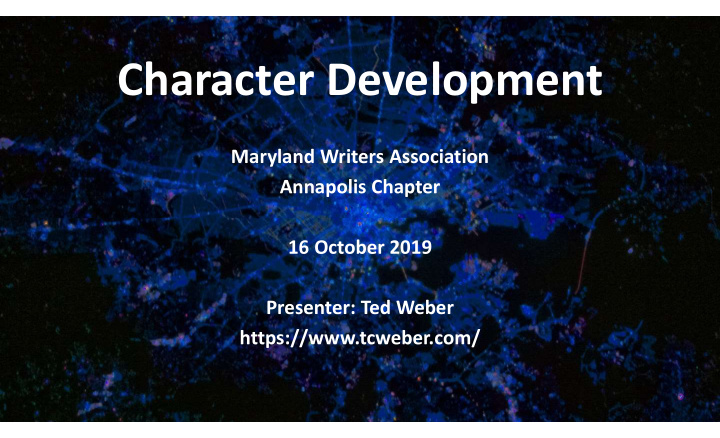



Character Development Maryland Writers Association Annapolis Chapter 16 October 2019 Presenter: Ted Weber https://www.tcweber.com/
Why are characters important? • Stories are about people (or other beings that are relatable). • “Great characters are the key to great fiction. A high- octane plot is nothing without credible, larger-than-life, highly developed enactors to make it meaningful.” – Donald Maass • The reader must care about your protagonist.
Memorable characters • Characters should seem real, like someone you know well. • Characters should be memorable: • Unpredictable (can sometimes surprise the reader with their actions) • Passionate about something • Carry a “ghost” or “wound” from their past • Inner conflict • Resourceful • Courageous • Fight for a just cause
Character roles in a story • Protagonist • Antagonist (not necessarily a villain, just opposed to the protagonist) • Other major characters • Minor characters • Extras
Your protagonist • Desire (What does your character want?) • Ambition (His/her vision for the future) • Story goal (Concrete, immediate goal) • Stakes (for character and for others) • External conflict • Internal conflict
Core Values
More inner characteristics • Philosophy of life • Strongest character trait(s) • Weakest character trait(s) • Greatest hope • Deepest fear • Sense of humor • How character sees self • How others see character
Exterior characteristics • Height • Weight • Age • Ethnic heritage • Style of dressing • Color of eyes • Color of hair • Physical description
Backstory
Backstory • Best childhood memory • Work experience • Worst childhood memory • Favorite music • Family • Favorite books • Best friend • Favorite movies • Female friends • Hobbies • Male friends • Favorite colors • Enemies • Description of home • Religion • Contents of purse or wallet • Political party • Educational background
Character Profile
Character arcs • Positive change • No change • Negative change
Wants vs. Needs • The Lie the character believes • Symptoms of the Lie • The character’s “ghost” or ”wound” • What the character wants • What the character needs • Suffering comes from clinging
The Normal World • Character is often (but not always) complacent and takes their life for granted • No reason for the character to question their Lie • Might be a good place, a bad place, or in between • Show the character’s flaws, what they have to overcome • But also show their good points
Inciting Event • An event that could change the character’s life, or a request from another character (like a mentor) • In the hero’s journey, this is the “call to adventure.” Typically, the protagonist wants to, or feels they have to, keep on with their normal daily life, and refuses the call to adventure. • But it’s already woken something inside the character.
First Plot Point • Something big happens to the protagonist 20- 25% into novel or screenplay • The character must react, and is forced out of their normal world (or chooses to leave). • Door of no return.
Mirror Moment • A scene in the midpoint, typically after a defeat • The character is forced to look within and reflect on who he/she is and who he/she must become in order to achieve his goal. • If he/she decides to continue on as he always has, he/she will surely fail (tragedy). • If the story is not a tragedy, the hero realizes he/she must either a) become stronger to overcome the odds or b) transform, shedding his biggest flaws and become more open-minded to new ideas and beliefs.
Third Plot Point • A reversal and/or revelation forces a crisis in the plot and the character’s arc • The character must choose between the Thing He Wants and the Thing He Needs—between the Lie and the Truth. Throughout the Second Half of the Second Act, he convinced himself he could have both. Now, he realizes that’s impossible. • Whatever the protagonist decides here, he will lose something vital. • The protagonist casts aside their old self and embraces the Truth he/she needs to overcome the antagonist.
Climax • Final confrontation • Protagonist completes their arc.
How will your character change? • Ex.: Luke accepts The Force. • Ex.: Scrooge becomes generous and unselfish. • Epiphany
Fitting plot and character together (exercise) • Write a one-sentence summary of the plot from each major character’s perspective Ex.: Frustrated by MediaCorp’s near-total control of information and power, Waylee takes action to bring down the company and its political allies. Ex.: Charles puts his skills to the test to pull off the greatest hack ever. Ex.: Going along with Waylee’s plan to take down MediaCorp, Pel quickly finds himself over his head. • Expand this to a long paragraph, how the character interacts with each major plot point
Some Resources • K. M. Weiland, Creating Character Arcs • Donald Maass, Writing the Breakout Novel • Donald Maass, The Emotional Craft of Fiction • James Scott Bell, Elements of Fiction Writing: Conflict and Suspense
Questions? https://www.tcweber.com/
Recommend
More recommend